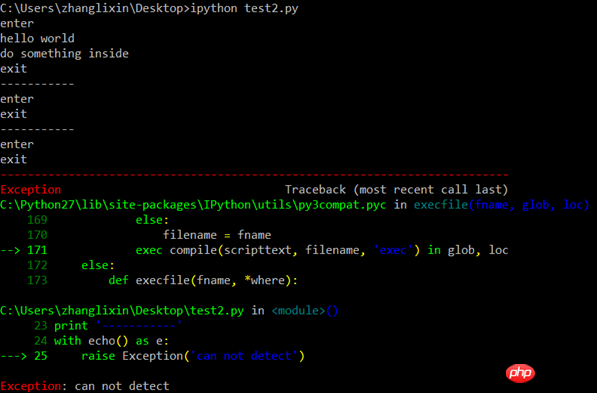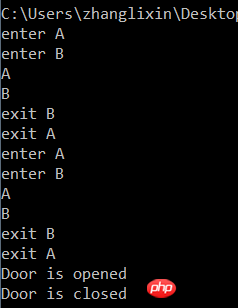Rumah >pembangunan bahagian belakang >Tutorial Python >Python基础教程之with、contextlib的实例用法详解
Python基础教程之with、contextlib的实例用法详解
- 巴扎黑asal
- 2017-08-09 11:02:251667semak imbas
这篇文章主要介绍了Python中with及contextlib的用法,结合实例形式较为详细的分析了with及contextlib的功能、使用方法与相关注意事项,需要的朋友可以参考下
本文实例讲述了Python中with及contextlib的用法。分享给大家供大家参考,具体如下:
平常Coding过程中,经常使用到的with场景是(打开文件进行文件处理,然后隐式地执行了文件句柄的关闭,同样适合socket之类的,这些类都提供了对with的支持):
with file('test.py','r') as f : print f.readline()
with的作用,类似try...finally...,提供一种上下文机制,要应用with语句的类,其内部必须提供两个内置函数__enter__以及__exit__。前者在主体代码执行前执行,后则在主体代码执行后执行。as后面的变量,是在__enter__函数中返回的。通过下面这个代码片段以及注释说明,可以清晰明白__enter__与__exit__的用法:
#!encoding:utf-8
class echo :
def output(self) :
print 'hello world'
def __enter__(self):
print 'enter'
return self #返回自身实例,当然也可以返回任何希望返回的东西
def __exit__(self, exception_type, exception_value, exception_traceback):
#若发生异常,会在这里捕捉到,可以进行异常处理
print 'exit'
#如果改__exit__可以处理改异常则通过返回True告知该异常不必传播,否则返回False
if exception_type == ValueError :
return True
else:
return False
with echo() as e:
e.output()
print 'do something inside'
print '-----------'
with echo() as e:
raise ValueError('value error')
print '-----------'
with echo() as e:
raise Exception('can not detect')运行结果:

contextlib是为了加强with语句,提供上下文机制的模块,它是通过Generator实现的。通过定义类以及写__enter__和__exit__来进行上下文管理虽然不难,但是很繁琐。contextlib中的contextmanager作为装饰器来提供一种针对函数级别的上下文管理机制。常用框架如下:
from contextlib import contextmanager
@contextmanager
def make_context() :
print 'enter'
try :
yield {}
except RuntimeError, err :
print 'error' , err
finally :
print 'exit'
with make_context() as value :
print valuecontextlib还有连个重要的东西,一个是nested,一个是closing,前者用于创建嵌套的上下文,后则用于帮你执行定义好的close函数。但是nested已经过时了,因为with已经可以通过多个上下文的直接嵌套了。下面是一个例子:
from contextlib import contextmanager
from contextlib import nested
from contextlib import closing
@contextmanager
def make_context(name) :
print 'enter', name
yield name
print 'exit', name
with nested(make_context('A'), make_context('B')) as (a, b) :
print a
print b
with make_context('A') as a, make_context('B') as b :
print a
print b
class Door(object) :
def open(self) :
print 'Door is opened'
def close(self) :
print 'Door is closed'
with closing(Door()) as door :
door.open()运行结果:

总结:python有很多强大的特性,由于我们平常总习惯于之前C++或java的一些编程习惯,时常忽略这些好的机制。因此,要学会使用这些python特性,让我们写的python程序更像是python。
Atas ialah kandungan terperinci Python基础教程之with、contextlib的实例用法详解. Untuk maklumat lanjut, sila ikut artikel berkaitan lain di laman web China PHP!

